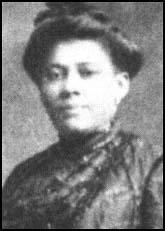Mary Talbert

Mary Burnett was born in Oberlin, Ohio in 1866. After graduating from Oberlin College, she became a teacher at Bethel University in Little Rock, Arkansas. Eventually she became vice principal but left teaching after marrying William Talbert and moving to Buffalo.
Talbert obtained a Ph.D degree at the University of Buffalo and during the First World War she served as a Red Cross nurse on the Western Front.
Talbert was the president of the Christian Culture Congress and the National Association of Colored Women (1916-21). A founder member of the National Association for the Advancement of Coloured People (NAACP), she was for several years its director.
After the First World War Talbert toured Europe giving lectures on women's rights and race relations. In 1921 she travelled thousands of miles making public speeches in an attempt to gain support for Dyer's anti-lynching bill. Mary Talbert died in 1923.
Primary Sources
(1) Mary White Ovington, letter to Lucy Burns of the National Woman's Party (17th December, 1920)
I am writing to you as an advisory member of the National Woman's Party asking if you will arrange that at the meeting, February fifteenth, a colored woman be invited to speak. I would suggest as the speaker, Mrs. Mary B. Talbert, until last June president of the Federation of Colored Women, and this summer one of the ten official members of the International Council of Women which met at Christiana. Mrs. Talbert is able, liberal in thought, and perhaps the best known colored woman in the United States today.
There was little voting and much terrorizing of Negroes in the South during the past elections and at Ocoee, Florida, there was a massacre. But equally sinister was the refusing to register women at such a place as Hampton, Virginia, where Hampton Institute has through many years endeavored to maintain kindly feelings between the two races, and yet where colored women were so insulted when they attempted to register that one woman said: "I could kill the clerk who questioned me; I could kill his wife and children."
If the South means to awaken a spirit like this it will eventually have war to face. But I believe that the Negro woman can win her right to vote if she is upheld by the rest of the country. The thinking southern woman is generally more fairminded than the southern man, but she cannot secure justice for the colored woman without she has the backing of all of us.
Will you not therefore, endeavor to have a committee appointed out of your great meeting in February which shall investigate and take some action regarding the status of the colored woman? The Woman's Party must have in its membership, South as well as North, women of broad enough vision and deep enough purpose to attack this problem. And if the women attack it, it will be solved.
(2) Mary White Ovington, letter to Alice Paul of the National Woman's Party (4 January 1921)
Not being a member of the National Woman's Party, I wrote to the members of the National Advisory Council whom I knew asking them if they would interest themselves in having a colored woman appear on the program of the Woman's Party Conference in Washington in February. Mrs. Brannan wrote me enthusiastically that the New York State Branch of the Woman's Party unanimously decided in favor of a colored speaker upon the program, but she telephoned me yesterday that you did not find this possible and asked me to address my communication directly to you.
The difficulty, as I understand it, seems to be that it has been necessary for the Woman's Party to restrict its program to representatives from organizations which have undertaken a more or less distinct feminist program and that Mrs. Talbert, whose name I suggested as today the most distinguished colored woman speaker in the country and as an ex-President of the National Association of Colored Women, would not be able to speak at your session because she does not represent a feminist organization.
